Comprehensive Business Law Report: UK Law and Case Analysis
VerifiedAdded on 2020/07/22
|11
|3602
|28
Report
AI Summary
This business law report provides a comprehensive overview of UK business law, covering key sources such as legislation, common law, human rights law, and EU law. The report analyzes the roles of government in law-making and examines various case scenarios, offering legal advice on issues related to company names, employee rights, and contract law. It addresses scenarios involving company registration, employee dismissal, and breach of contract, providing practical guidance and legal justifications. The report also discusses arbitration as a method for resolving disputes and offers advice on legal rights and obligations in specific business contexts. The report is a valuable resource for understanding the complexities of UK business law and its practical applications.
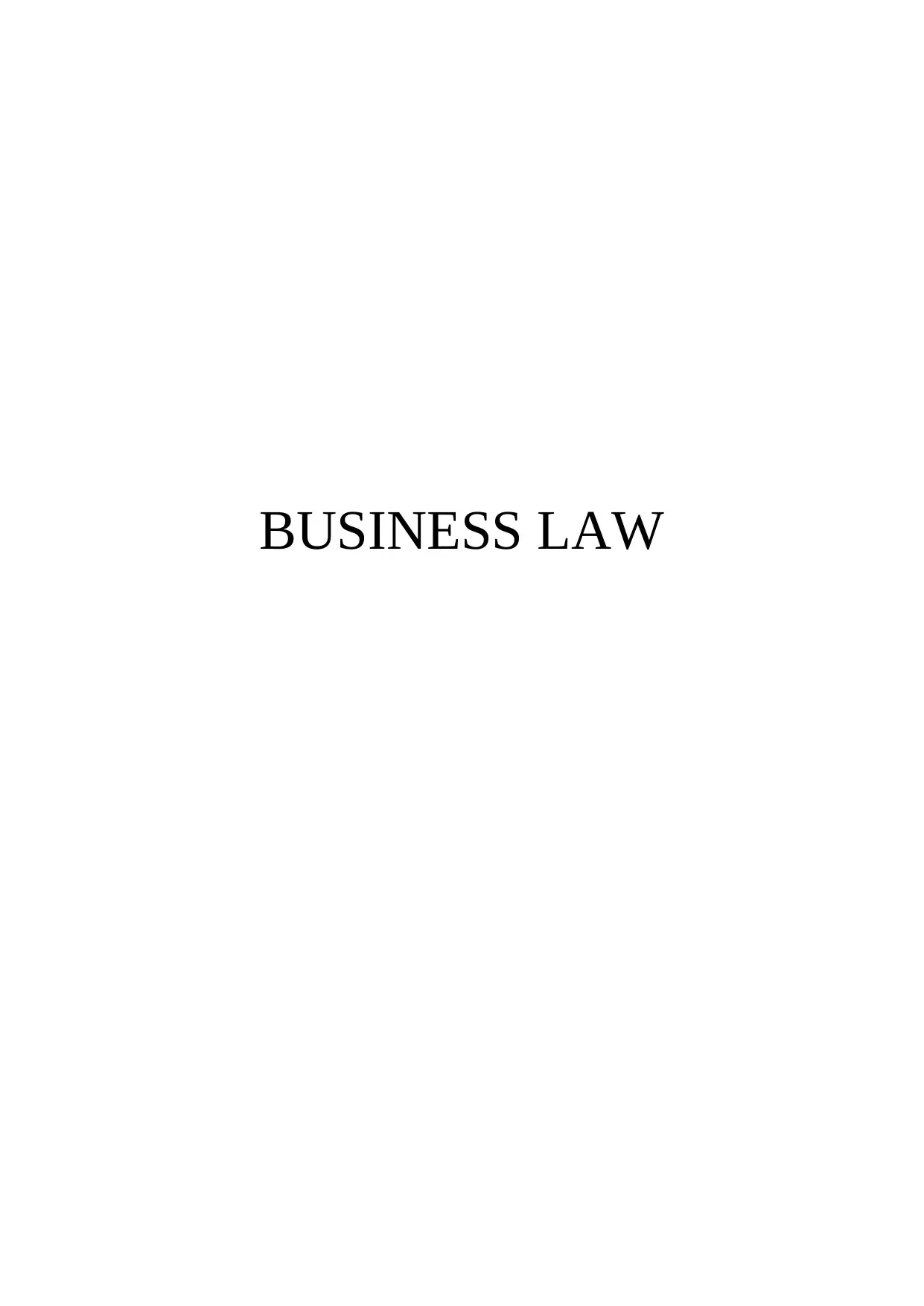
BUSINESS LAW
Paraphrase This Document
Need a fresh take? Get an instant paraphrase of this document with our AI Paraphraser
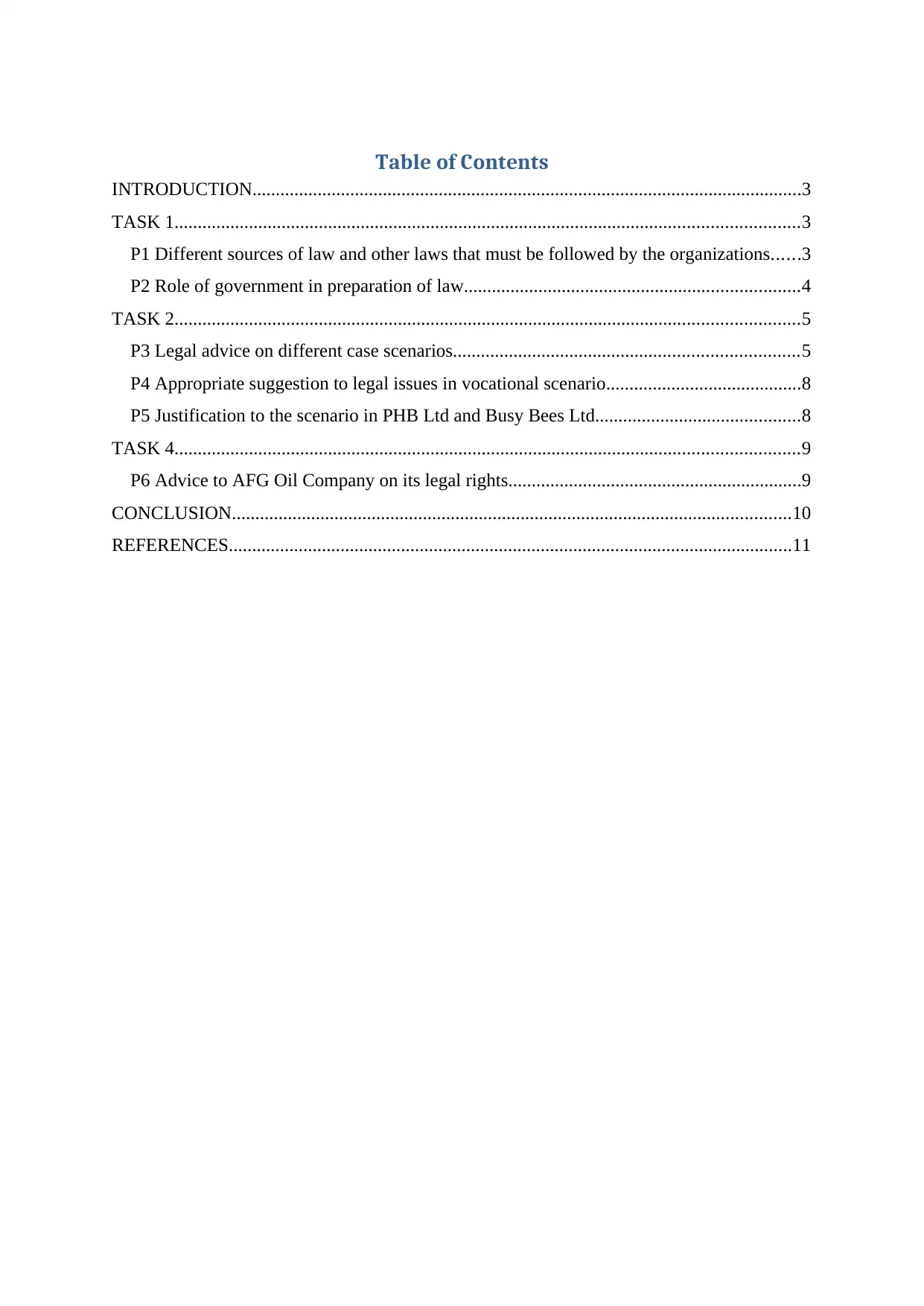
Table of Contents
INTRODUCTION......................................................................................................................3
TASK 1......................................................................................................................................3
P1 Different sources of law and other laws that must be followed by the organizations......3
P2 Role of government in preparation of law........................................................................4
TASK 2......................................................................................................................................5
P3 Legal advice on different case scenarios..........................................................................5
P4 Appropriate suggestion to legal issues in vocational scenario..........................................8
P5 Justification to the scenario in PHB Ltd and Busy Bees Ltd............................................8
TASK 4......................................................................................................................................9
P6 Advice to AFG Oil Company on its legal rights...............................................................9
CONCLUSION........................................................................................................................10
REFERENCES.........................................................................................................................11
INTRODUCTION......................................................................................................................3
TASK 1......................................................................................................................................3
P1 Different sources of law and other laws that must be followed by the organizations......3
P2 Role of government in preparation of law........................................................................4
TASK 2......................................................................................................................................5
P3 Legal advice on different case scenarios..........................................................................5
P4 Appropriate suggestion to legal issues in vocational scenario..........................................8
P5 Justification to the scenario in PHB Ltd and Busy Bees Ltd............................................8
TASK 4......................................................................................................................................9
P6 Advice to AFG Oil Company on its legal rights...............................................................9
CONCLUSION........................................................................................................................10
REFERENCES.........................................................................................................................11
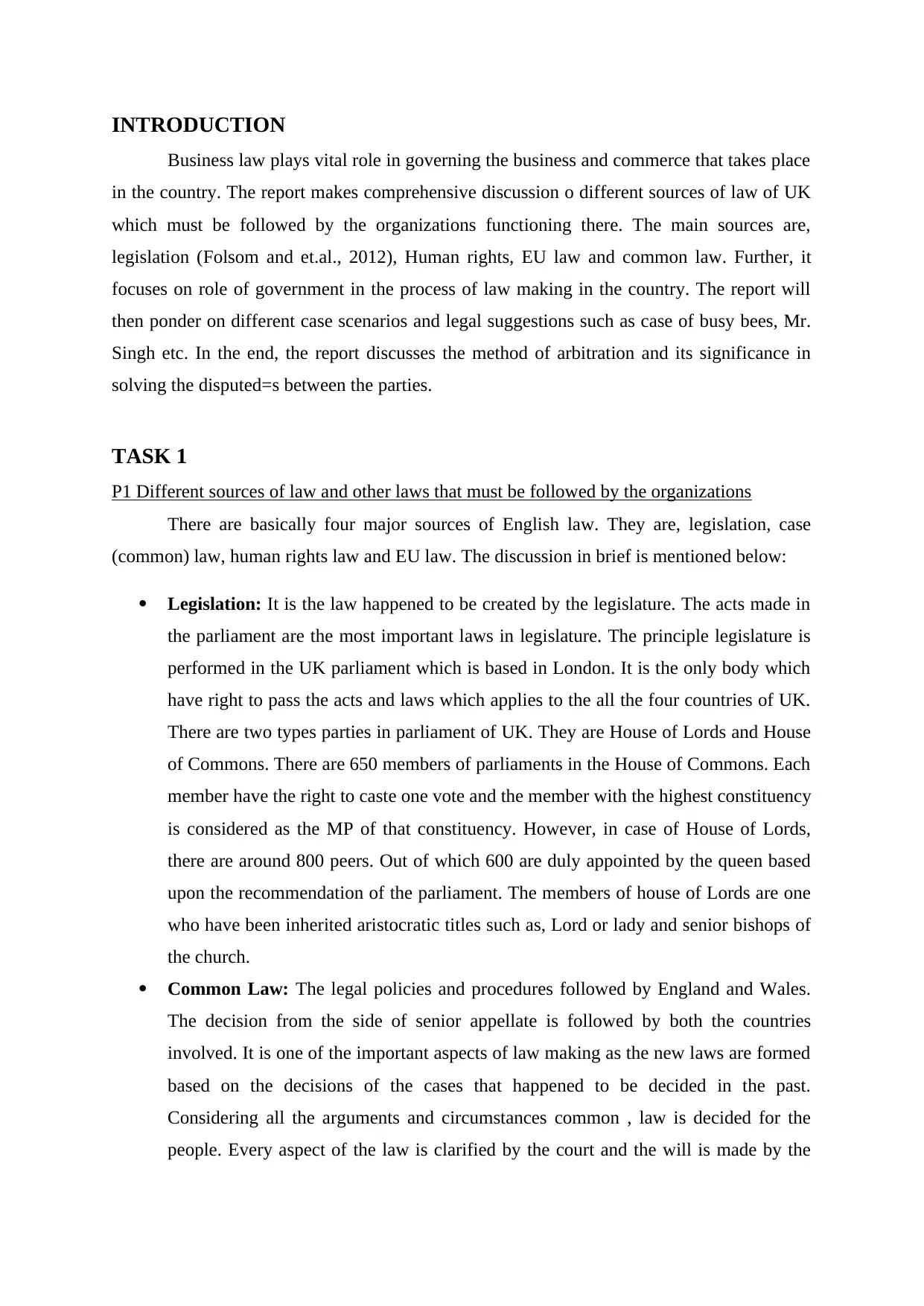
INTRODUCTION
Business law plays vital role in governing the business and commerce that takes place
in the country. The report makes comprehensive discussion o different sources of law of UK
which must be followed by the organizations functioning there. The main sources are,
legislation (Folsom and et.al., 2012), Human rights, EU law and common law. Further, it
focuses on role of government in the process of law making in the country. The report will
then ponder on different case scenarios and legal suggestions such as case of busy bees, Mr.
Singh etc. In the end, the report discusses the method of arbitration and its significance in
solving the disputed=s between the parties.
TASK 1
P1 Different sources of law and other laws that must be followed by the organizations
There are basically four major sources of English law. They are, legislation, case
(common) law, human rights law and EU law. The discussion in brief is mentioned below:
Legislation: It is the law happened to be created by the legislature. The acts made in
the parliament are the most important laws in legislature. The principle legislature is
performed in the UK parliament which is based in London. It is the only body which
have right to pass the acts and laws which applies to the all the four countries of UK.
There are two types parties in parliament of UK. They are House of Lords and House
of Commons. There are 650 members of parliaments in the House of Commons. Each
member have the right to caste one vote and the member with the highest constituency
is considered as the MP of that constituency. However, in case of House of Lords,
there are around 800 peers. Out of which 600 are duly appointed by the queen based
upon the recommendation of the parliament. The members of house of Lords are one
who have been inherited aristocratic titles such as, Lord or lady and senior bishops of
the church.
Common Law: The legal policies and procedures followed by England and Wales.
The decision from the side of senior appellate is followed by both the countries
involved. It is one of the important aspects of law making as the new laws are formed
based on the decisions of the cases that happened to be decided in the past.
Considering all the arguments and circumstances common , law is decided for the
people. Every aspect of the law is clarified by the court and the will is made by the
Business law plays vital role in governing the business and commerce that takes place
in the country. The report makes comprehensive discussion o different sources of law of UK
which must be followed by the organizations functioning there. The main sources are,
legislation (Folsom and et.al., 2012), Human rights, EU law and common law. Further, it
focuses on role of government in the process of law making in the country. The report will
then ponder on different case scenarios and legal suggestions such as case of busy bees, Mr.
Singh etc. In the end, the report discusses the method of arbitration and its significance in
solving the disputed=s between the parties.
TASK 1
P1 Different sources of law and other laws that must be followed by the organizations
There are basically four major sources of English law. They are, legislation, case
(common) law, human rights law and EU law. The discussion in brief is mentioned below:
Legislation: It is the law happened to be created by the legislature. The acts made in
the parliament are the most important laws in legislature. The principle legislature is
performed in the UK parliament which is based in London. It is the only body which
have right to pass the acts and laws which applies to the all the four countries of UK.
There are two types parties in parliament of UK. They are House of Lords and House
of Commons. There are 650 members of parliaments in the House of Commons. Each
member have the right to caste one vote and the member with the highest constituency
is considered as the MP of that constituency. However, in case of House of Lords,
there are around 800 peers. Out of which 600 are duly appointed by the queen based
upon the recommendation of the parliament. The members of house of Lords are one
who have been inherited aristocratic titles such as, Lord or lady and senior bishops of
the church.
Common Law: The legal policies and procedures followed by England and Wales.
The decision from the side of senior appellate is followed by both the countries
involved. It is one of the important aspects of law making as the new laws are formed
based on the decisions of the cases that happened to be decided in the past.
Considering all the arguments and circumstances common , law is decided for the
people. Every aspect of the law is clarified by the court and the will is made by the
⊘ This is a preview!⊘
Do you want full access?
Subscribe today to unlock all pages.

Trusted by 1+ million students worldwide
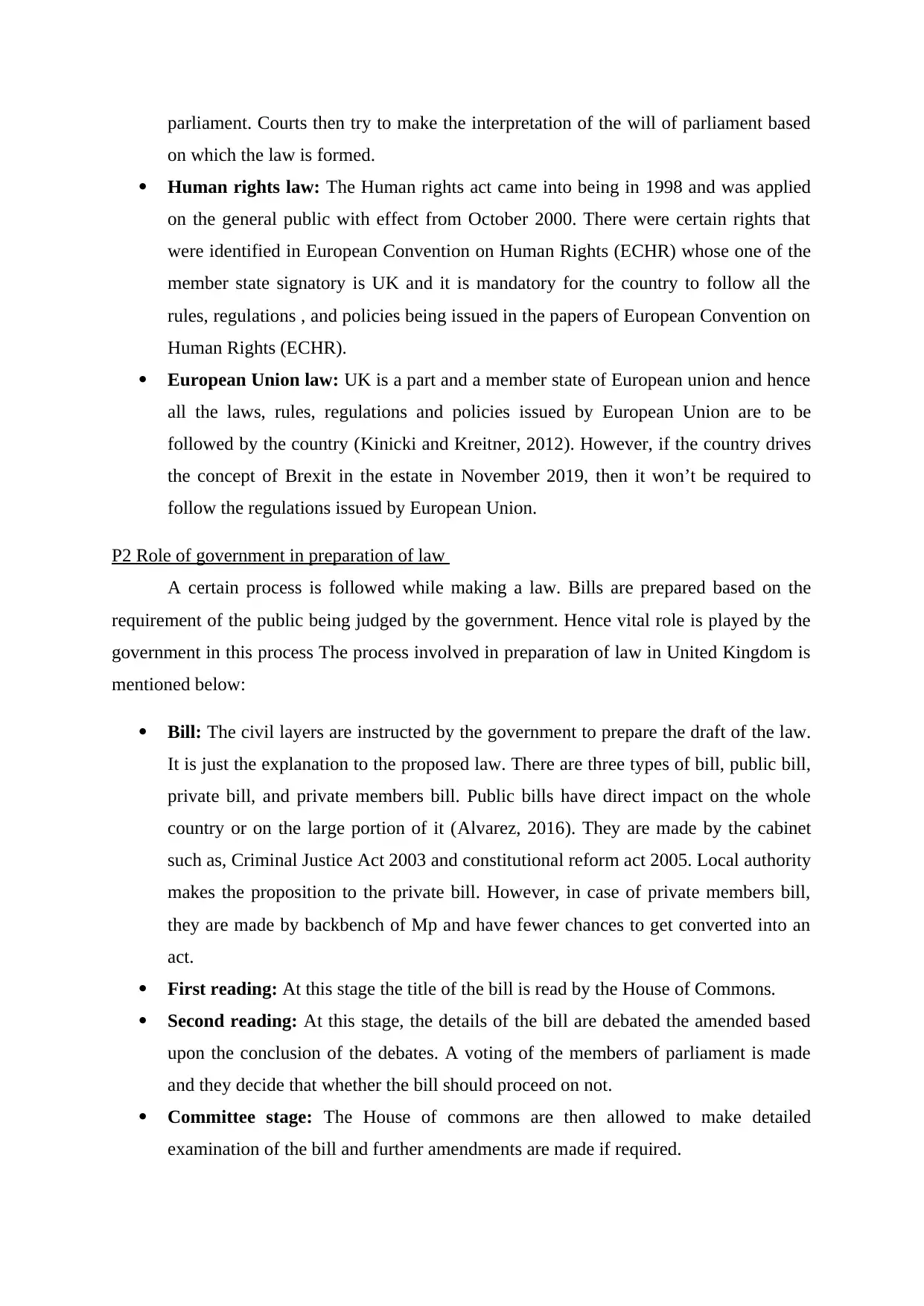
parliament. Courts then try to make the interpretation of the will of parliament based
on which the law is formed.
Human rights law: The Human rights act came into being in 1998 and was applied
on the general public with effect from October 2000. There were certain rights that
were identified in European Convention on Human Rights (ECHR) whose one of the
member state signatory is UK and it is mandatory for the country to follow all the
rules, regulations , and policies being issued in the papers of European Convention on
Human Rights (ECHR).
European Union law: UK is a part and a member state of European union and hence
all the laws, rules, regulations and policies issued by European Union are to be
followed by the country (Kinicki and Kreitner, 2012). However, if the country drives
the concept of Brexit in the estate in November 2019, then it won’t be required to
follow the regulations issued by European Union.
P2 Role of government in preparation of law
A certain process is followed while making a law. Bills are prepared based on the
requirement of the public being judged by the government. Hence vital role is played by the
government in this process The process involved in preparation of law in United Kingdom is
mentioned below:
Bill: The civil layers are instructed by the government to prepare the draft of the law.
It is just the explanation to the proposed law. There are three types of bill, public bill,
private bill, and private members bill. Public bills have direct impact on the whole
country or on the large portion of it (Alvarez, 2016). They are made by the cabinet
such as, Criminal Justice Act 2003 and constitutional reform act 2005. Local authority
makes the proposition to the private bill. However, in case of private members bill,
they are made by backbench of Mp and have fewer chances to get converted into an
act.
First reading: At this stage the title of the bill is read by the House of Commons.
Second reading: At this stage, the details of the bill are debated the amended based
upon the conclusion of the debates. A voting of the members of parliament is made
and they decide that whether the bill should proceed on not.
Committee stage: The House of commons are then allowed to make detailed
examination of the bill and further amendments are made if required.
on which the law is formed.
Human rights law: The Human rights act came into being in 1998 and was applied
on the general public with effect from October 2000. There were certain rights that
were identified in European Convention on Human Rights (ECHR) whose one of the
member state signatory is UK and it is mandatory for the country to follow all the
rules, regulations , and policies being issued in the papers of European Convention on
Human Rights (ECHR).
European Union law: UK is a part and a member state of European union and hence
all the laws, rules, regulations and policies issued by European Union are to be
followed by the country (Kinicki and Kreitner, 2012). However, if the country drives
the concept of Brexit in the estate in November 2019, then it won’t be required to
follow the regulations issued by European Union.
P2 Role of government in preparation of law
A certain process is followed while making a law. Bills are prepared based on the
requirement of the public being judged by the government. Hence vital role is played by the
government in this process The process involved in preparation of law in United Kingdom is
mentioned below:
Bill: The civil layers are instructed by the government to prepare the draft of the law.
It is just the explanation to the proposed law. There are three types of bill, public bill,
private bill, and private members bill. Public bills have direct impact on the whole
country or on the large portion of it (Alvarez, 2016). They are made by the cabinet
such as, Criminal Justice Act 2003 and constitutional reform act 2005. Local authority
makes the proposition to the private bill. However, in case of private members bill,
they are made by backbench of Mp and have fewer chances to get converted into an
act.
First reading: At this stage the title of the bill is read by the House of Commons.
Second reading: At this stage, the details of the bill are debated the amended based
upon the conclusion of the debates. A voting of the members of parliament is made
and they decide that whether the bill should proceed on not.
Committee stage: The House of commons are then allowed to make detailed
examination of the bill and further amendments are made if required.
Paraphrase This Document
Need a fresh take? Get an instant paraphrase of this document with our AI Paraphraser
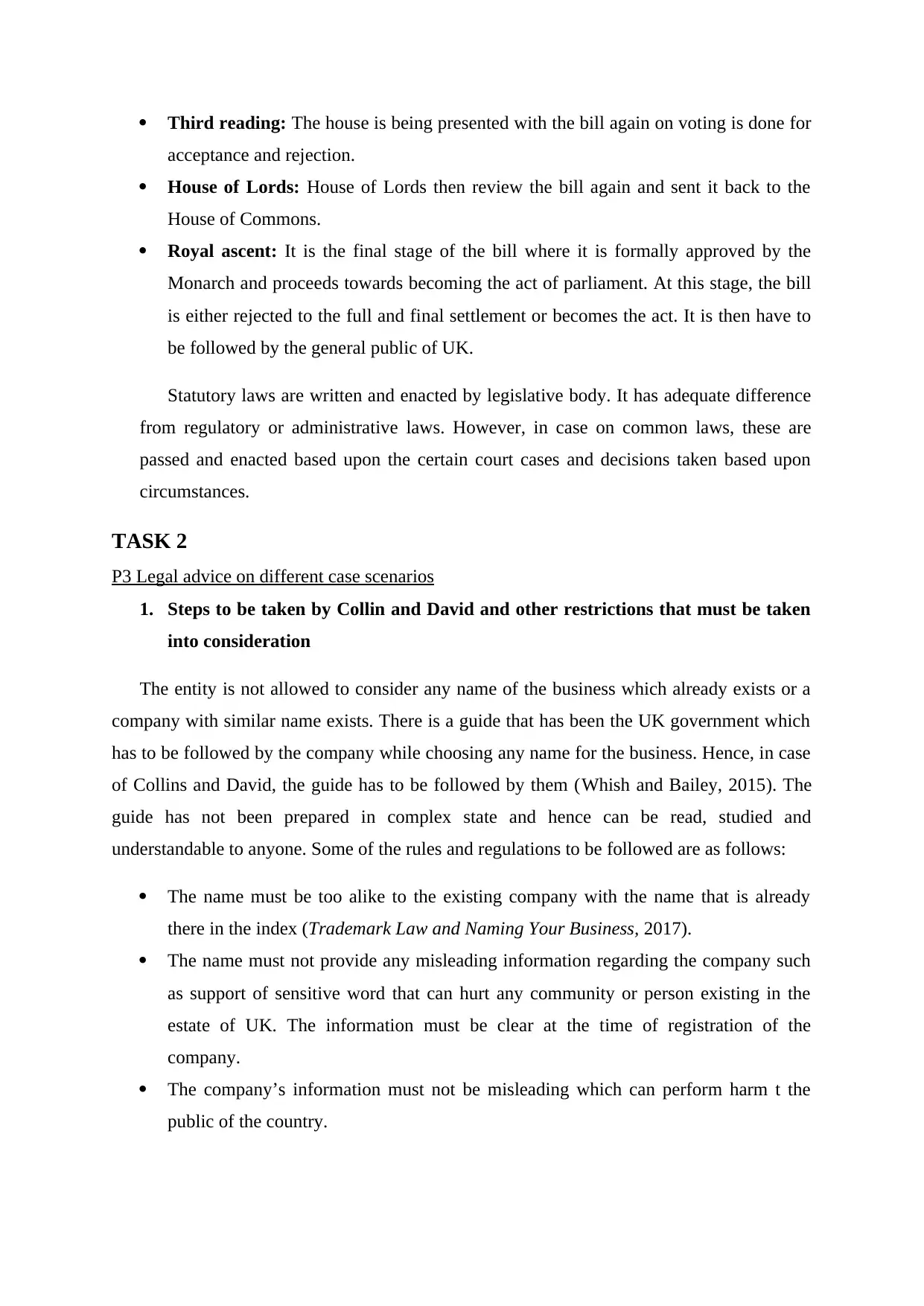
Third reading: The house is being presented with the bill again on voting is done for
acceptance and rejection.
House of Lords: House of Lords then review the bill again and sent it back to the
House of Commons.
Royal ascent: It is the final stage of the bill where it is formally approved by the
Monarch and proceeds towards becoming the act of parliament. At this stage, the bill
is either rejected to the full and final settlement or becomes the act. It is then have to
be followed by the general public of UK.
Statutory laws are written and enacted by legislative body. It has adequate difference
from regulatory or administrative laws. However, in case on common laws, these are
passed and enacted based upon the certain court cases and decisions taken based upon
circumstances.
TASK 2
P3 Legal advice on different case scenarios
1. Steps to be taken by Collin and David and other restrictions that must be taken
into consideration
The entity is not allowed to consider any name of the business which already exists or a
company with similar name exists. There is a guide that has been the UK government which
has to be followed by the company while choosing any name for the business. Hence, in case
of Collins and David, the guide has to be followed by them (Whish and Bailey, 2015). The
guide has not been prepared in complex state and hence can be read, studied and
understandable to anyone. Some of the rules and regulations to be followed are as follows:
The name must be too alike to the existing company with the name that is already
there in the index (Trademark Law and Naming Your Business, 2017).
The name must not provide any misleading information regarding the company such
as support of sensitive word that can hurt any community or person existing in the
estate of UK. The information must be clear at the time of registration of the
company.
The company’s information must not be misleading which can perform harm t the
public of the country.
acceptance and rejection.
House of Lords: House of Lords then review the bill again and sent it back to the
House of Commons.
Royal ascent: It is the final stage of the bill where it is formally approved by the
Monarch and proceeds towards becoming the act of parliament. At this stage, the bill
is either rejected to the full and final settlement or becomes the act. It is then have to
be followed by the general public of UK.
Statutory laws are written and enacted by legislative body. It has adequate difference
from regulatory or administrative laws. However, in case on common laws, these are
passed and enacted based upon the certain court cases and decisions taken based upon
circumstances.
TASK 2
P3 Legal advice on different case scenarios
1. Steps to be taken by Collin and David and other restrictions that must be taken
into consideration
The entity is not allowed to consider any name of the business which already exists or a
company with similar name exists. There is a guide that has been the UK government which
has to be followed by the company while choosing any name for the business. Hence, in case
of Collins and David, the guide has to be followed by them (Whish and Bailey, 2015). The
guide has not been prepared in complex state and hence can be read, studied and
understandable to anyone. Some of the rules and regulations to be followed are as follows:
The name must be too alike to the existing company with the name that is already
there in the index (Trademark Law and Naming Your Business, 2017).
The name must not provide any misleading information regarding the company such
as support of sensitive word that can hurt any community or person existing in the
estate of UK. The information must be clear at the time of registration of the
company.
The company’s information must not be misleading which can perform harm t the
public of the country.
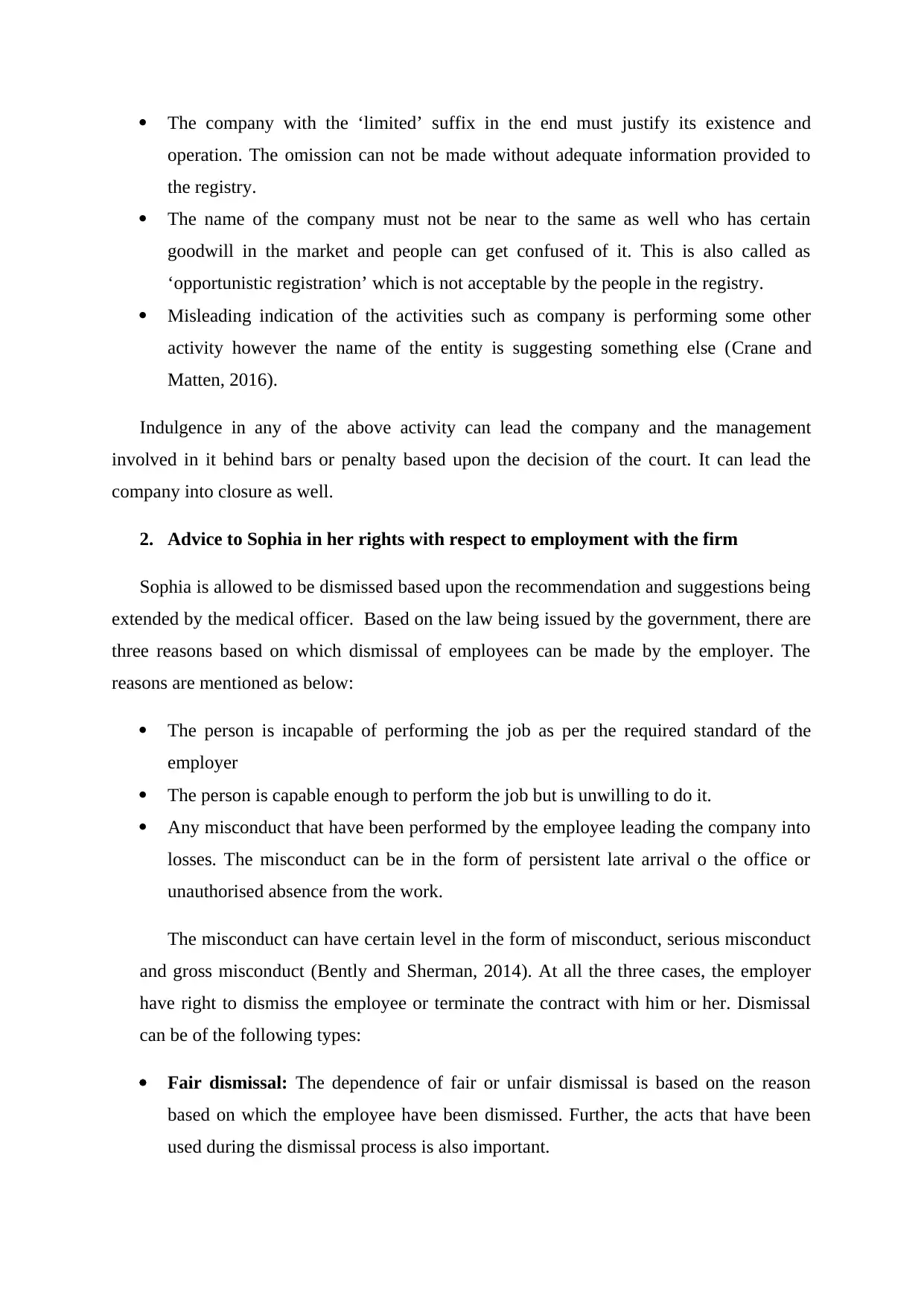
The company with the ‘limited’ suffix in the end must justify its existence and
operation. The omission can not be made without adequate information provided to
the registry.
The name of the company must not be near to the same as well who has certain
goodwill in the market and people can get confused of it. This is also called as
‘opportunistic registration’ which is not acceptable by the people in the registry.
Misleading indication of the activities such as company is performing some other
activity however the name of the entity is suggesting something else (Crane and
Matten, 2016).
Indulgence in any of the above activity can lead the company and the management
involved in it behind bars or penalty based upon the decision of the court. It can lead the
company into closure as well.
2. Advice to Sophia in her rights with respect to employment with the firm
Sophia is allowed to be dismissed based upon the recommendation and suggestions being
extended by the medical officer. Based on the law being issued by the government, there are
three reasons based on which dismissal of employees can be made by the employer. The
reasons are mentioned as below:
The person is incapable of performing the job as per the required standard of the
employer
The person is capable enough to perform the job but is unwilling to do it.
Any misconduct that have been performed by the employee leading the company into
losses. The misconduct can be in the form of persistent late arrival o the office or
unauthorised absence from the work.
The misconduct can have certain level in the form of misconduct, serious misconduct
and gross misconduct (Bently and Sherman, 2014). At all the three cases, the employer
have right to dismiss the employee or terminate the contract with him or her. Dismissal
can be of the following types:
Fair dismissal: The dependence of fair or unfair dismissal is based on the reason
based on which the employee have been dismissed. Further, the acts that have been
used during the dismissal process is also important.
operation. The omission can not be made without adequate information provided to
the registry.
The name of the company must not be near to the same as well who has certain
goodwill in the market and people can get confused of it. This is also called as
‘opportunistic registration’ which is not acceptable by the people in the registry.
Misleading indication of the activities such as company is performing some other
activity however the name of the entity is suggesting something else (Crane and
Matten, 2016).
Indulgence in any of the above activity can lead the company and the management
involved in it behind bars or penalty based upon the decision of the court. It can lead the
company into closure as well.
2. Advice to Sophia in her rights with respect to employment with the firm
Sophia is allowed to be dismissed based upon the recommendation and suggestions being
extended by the medical officer. Based on the law being issued by the government, there are
three reasons based on which dismissal of employees can be made by the employer. The
reasons are mentioned as below:
The person is incapable of performing the job as per the required standard of the
employer
The person is capable enough to perform the job but is unwilling to do it.
Any misconduct that have been performed by the employee leading the company into
losses. The misconduct can be in the form of persistent late arrival o the office or
unauthorised absence from the work.
The misconduct can have certain level in the form of misconduct, serious misconduct
and gross misconduct (Bently and Sherman, 2014). At all the three cases, the employer
have right to dismiss the employee or terminate the contract with him or her. Dismissal
can be of the following types:
Fair dismissal: The dependence of fair or unfair dismissal is based on the reason
based on which the employee have been dismissed. Further, the acts that have been
used during the dismissal process is also important.
⊘ This is a preview!⊘
Do you want full access?
Subscribe today to unlock all pages.

Trusted by 1+ million students worldwide
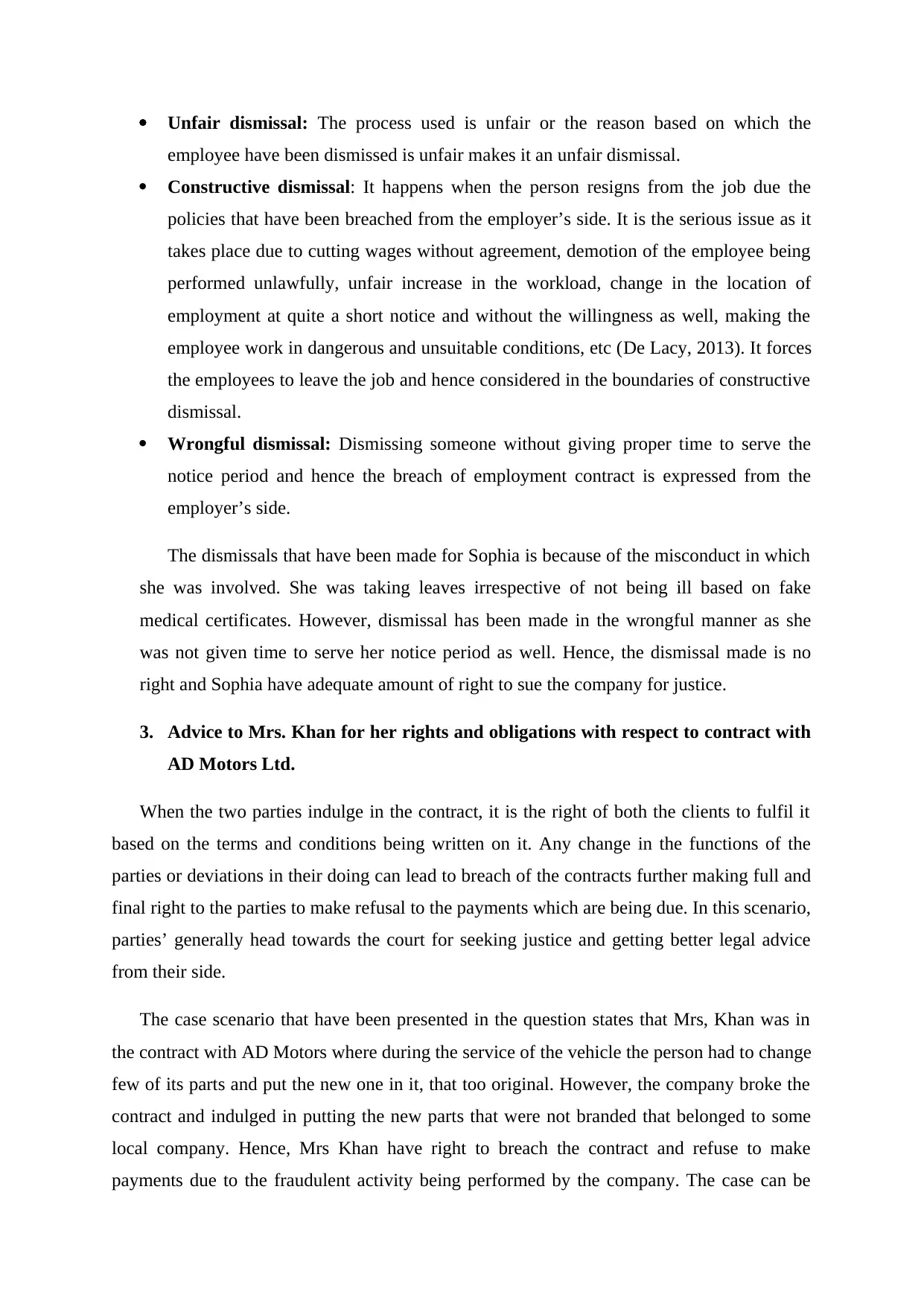
Unfair dismissal: The process used is unfair or the reason based on which the
employee have been dismissed is unfair makes it an unfair dismissal.
Constructive dismissal: It happens when the person resigns from the job due the
policies that have been breached from the employer’s side. It is the serious issue as it
takes place due to cutting wages without agreement, demotion of the employee being
performed unlawfully, unfair increase in the workload, change in the location of
employment at quite a short notice and without the willingness as well, making the
employee work in dangerous and unsuitable conditions, etc (De Lacy, 2013). It forces
the employees to leave the job and hence considered in the boundaries of constructive
dismissal.
Wrongful dismissal: Dismissing someone without giving proper time to serve the
notice period and hence the breach of employment contract is expressed from the
employer’s side.
The dismissals that have been made for Sophia is because of the misconduct in which
she was involved. She was taking leaves irrespective of not being ill based on fake
medical certificates. However, dismissal has been made in the wrongful manner as she
was not given time to serve her notice period as well. Hence, the dismissal made is no
right and Sophia have adequate amount of right to sue the company for justice.
3. Advice to Mrs. Khan for her rights and obligations with respect to contract with
AD Motors Ltd.
When the two parties indulge in the contract, it is the right of both the clients to fulfil it
based on the terms and conditions being written on it. Any change in the functions of the
parties or deviations in their doing can lead to breach of the contracts further making full and
final right to the parties to make refusal to the payments which are being due. In this scenario,
parties’ generally head towards the court for seeking justice and getting better legal advice
from their side.
The case scenario that have been presented in the question states that Mrs, Khan was in
the contract with AD Motors where during the service of the vehicle the person had to change
few of its parts and put the new one in it, that too original. However, the company broke the
contract and indulged in putting the new parts that were not branded that belonged to some
local company. Hence, Mrs Khan have right to breach the contract and refuse to make
payments due to the fraudulent activity being performed by the company. The case can be
employee have been dismissed is unfair makes it an unfair dismissal.
Constructive dismissal: It happens when the person resigns from the job due the
policies that have been breached from the employer’s side. It is the serious issue as it
takes place due to cutting wages without agreement, demotion of the employee being
performed unlawfully, unfair increase in the workload, change in the location of
employment at quite a short notice and without the willingness as well, making the
employee work in dangerous and unsuitable conditions, etc (De Lacy, 2013). It forces
the employees to leave the job and hence considered in the boundaries of constructive
dismissal.
Wrongful dismissal: Dismissing someone without giving proper time to serve the
notice period and hence the breach of employment contract is expressed from the
employer’s side.
The dismissals that have been made for Sophia is because of the misconduct in which
she was involved. She was taking leaves irrespective of not being ill based on fake
medical certificates. However, dismissal has been made in the wrongful manner as she
was not given time to serve her notice period as well. Hence, the dismissal made is no
right and Sophia have adequate amount of right to sue the company for justice.
3. Advice to Mrs. Khan for her rights and obligations with respect to contract with
AD Motors Ltd.
When the two parties indulge in the contract, it is the right of both the clients to fulfil it
based on the terms and conditions being written on it. Any change in the functions of the
parties or deviations in their doing can lead to breach of the contracts further making full and
final right to the parties to make refusal to the payments which are being due. In this scenario,
parties’ generally head towards the court for seeking justice and getting better legal advice
from their side.
The case scenario that have been presented in the question states that Mrs, Khan was in
the contract with AD Motors where during the service of the vehicle the person had to change
few of its parts and put the new one in it, that too original. However, the company broke the
contract and indulged in putting the new parts that were not branded that belonged to some
local company. Hence, Mrs Khan have right to breach the contract and refuse to make
payments due to the fraudulent activity being performed by the company. The case can be
Paraphrase This Document
Need a fresh take? Get an instant paraphrase of this document with our AI Paraphraser
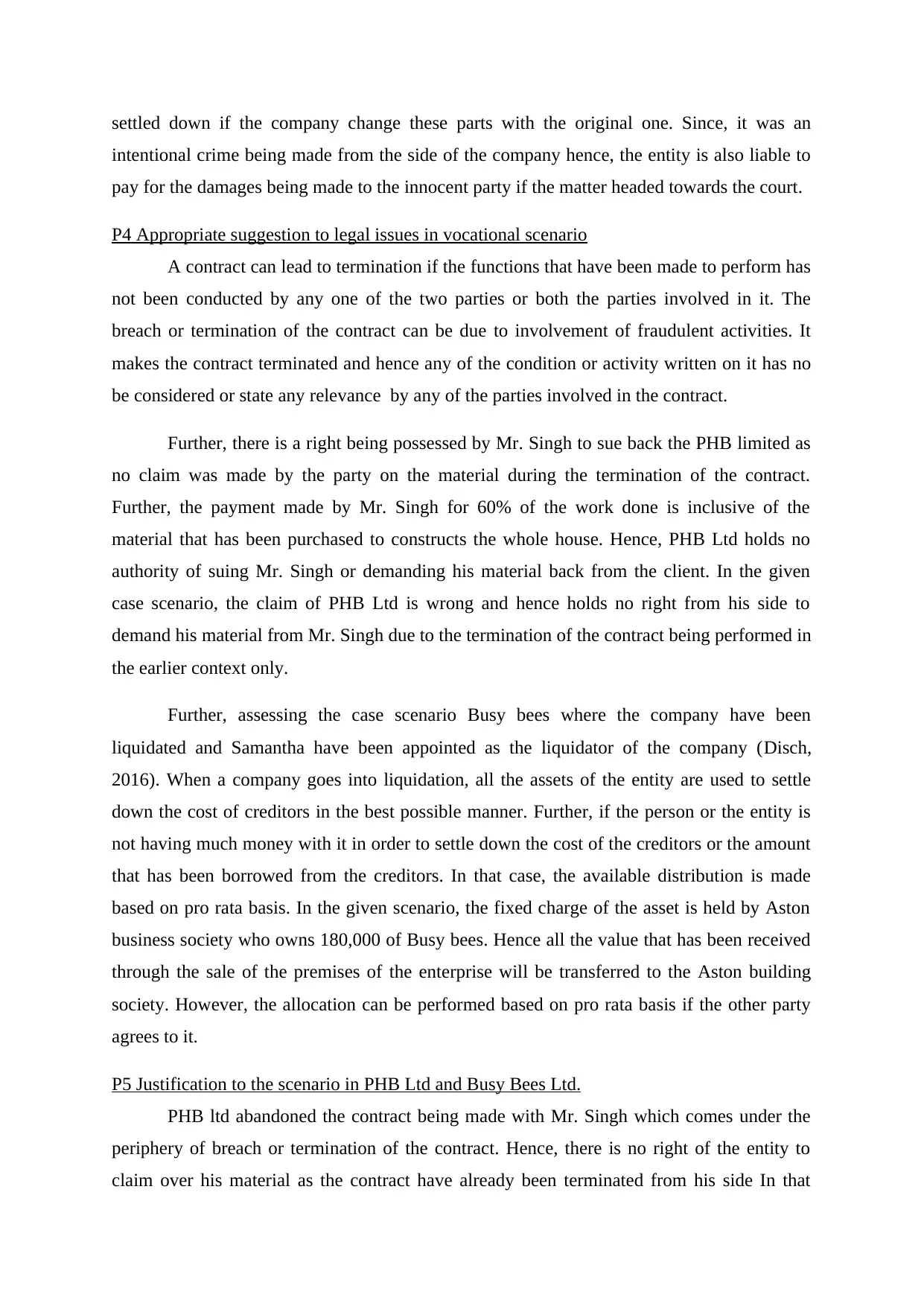
settled down if the company change these parts with the original one. Since, it was an
intentional crime being made from the side of the company hence, the entity is also liable to
pay for the damages being made to the innocent party if the matter headed towards the court.
P4 Appropriate suggestion to legal issues in vocational scenario
A contract can lead to termination if the functions that have been made to perform has
not been conducted by any one of the two parties or both the parties involved in it. The
breach or termination of the contract can be due to involvement of fraudulent activities. It
makes the contract terminated and hence any of the condition or activity written on it has no
be considered or state any relevance by any of the parties involved in the contract.
Further, there is a right being possessed by Mr. Singh to sue back the PHB limited as
no claim was made by the party on the material during the termination of the contract.
Further, the payment made by Mr. Singh for 60% of the work done is inclusive of the
material that has been purchased to constructs the whole house. Hence, PHB Ltd holds no
authority of suing Mr. Singh or demanding his material back from the client. In the given
case scenario, the claim of PHB Ltd is wrong and hence holds no right from his side to
demand his material from Mr. Singh due to the termination of the contract being performed in
the earlier context only.
Further, assessing the case scenario Busy bees where the company have been
liquidated and Samantha have been appointed as the liquidator of the company (Disch,
2016). When a company goes into liquidation, all the assets of the entity are used to settle
down the cost of creditors in the best possible manner. Further, if the person or the entity is
not having much money with it in order to settle down the cost of the creditors or the amount
that has been borrowed from the creditors. In that case, the available distribution is made
based on pro rata basis. In the given scenario, the fixed charge of the asset is held by Aston
business society who owns 180,000 of Busy bees. Hence all the value that has been received
through the sale of the premises of the enterprise will be transferred to the Aston building
society. However, the allocation can be performed based on pro rata basis if the other party
agrees to it.
P5 Justification to the scenario in PHB Ltd and Busy Bees Ltd.
PHB ltd abandoned the contract being made with Mr. Singh which comes under the
periphery of breach or termination of the contract. Hence, there is no right of the entity to
claim over his material as the contract have already been terminated from his side In that
intentional crime being made from the side of the company hence, the entity is also liable to
pay for the damages being made to the innocent party if the matter headed towards the court.
P4 Appropriate suggestion to legal issues in vocational scenario
A contract can lead to termination if the functions that have been made to perform has
not been conducted by any one of the two parties or both the parties involved in it. The
breach or termination of the contract can be due to involvement of fraudulent activities. It
makes the contract terminated and hence any of the condition or activity written on it has no
be considered or state any relevance by any of the parties involved in the contract.
Further, there is a right being possessed by Mr. Singh to sue back the PHB limited as
no claim was made by the party on the material during the termination of the contract.
Further, the payment made by Mr. Singh for 60% of the work done is inclusive of the
material that has been purchased to constructs the whole house. Hence, PHB Ltd holds no
authority of suing Mr. Singh or demanding his material back from the client. In the given
case scenario, the claim of PHB Ltd is wrong and hence holds no right from his side to
demand his material from Mr. Singh due to the termination of the contract being performed in
the earlier context only.
Further, assessing the case scenario Busy bees where the company have been
liquidated and Samantha have been appointed as the liquidator of the company (Disch,
2016). When a company goes into liquidation, all the assets of the entity are used to settle
down the cost of creditors in the best possible manner. Further, if the person or the entity is
not having much money with it in order to settle down the cost of the creditors or the amount
that has been borrowed from the creditors. In that case, the available distribution is made
based on pro rata basis. In the given scenario, the fixed charge of the asset is held by Aston
business society who owns 180,000 of Busy bees. Hence all the value that has been received
through the sale of the premises of the enterprise will be transferred to the Aston building
society. However, the allocation can be performed based on pro rata basis if the other party
agrees to it.
P5 Justification to the scenario in PHB Ltd and Busy Bees Ltd.
PHB ltd abandoned the contract being made with Mr. Singh which comes under the
periphery of breach or termination of the contract. Hence, there is no right of the entity to
claim over his material as the contract have already been terminated from his side In that
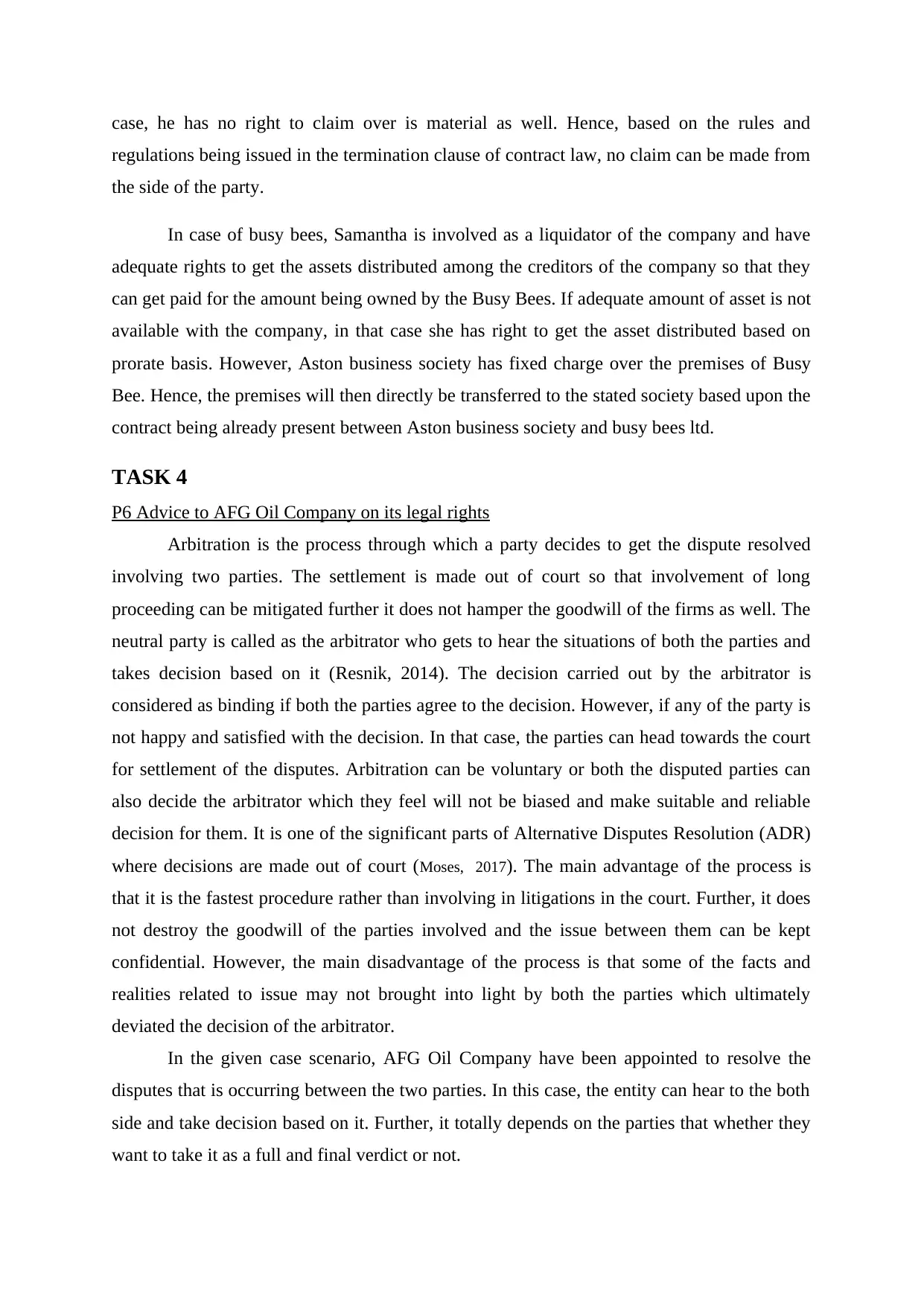
case, he has no right to claim over is material as well. Hence, based on the rules and
regulations being issued in the termination clause of contract law, no claim can be made from
the side of the party.
In case of busy bees, Samantha is involved as a liquidator of the company and have
adequate rights to get the assets distributed among the creditors of the company so that they
can get paid for the amount being owned by the Busy Bees. If adequate amount of asset is not
available with the company, in that case she has right to get the asset distributed based on
prorate basis. However, Aston business society has fixed charge over the premises of Busy
Bee. Hence, the premises will then directly be transferred to the stated society based upon the
contract being already present between Aston business society and busy bees ltd.
TASK 4
P6 Advice to AFG Oil Company on its legal rights
Arbitration is the process through which a party decides to get the dispute resolved
involving two parties. The settlement is made out of court so that involvement of long
proceeding can be mitigated further it does not hamper the goodwill of the firms as well. The
neutral party is called as the arbitrator who gets to hear the situations of both the parties and
takes decision based on it (Resnik, 2014). The decision carried out by the arbitrator is
considered as binding if both the parties agree to the decision. However, if any of the party is
not happy and satisfied with the decision. In that case, the parties can head towards the court
for settlement of the disputes. Arbitration can be voluntary or both the disputed parties can
also decide the arbitrator which they feel will not be biased and make suitable and reliable
decision for them. It is one of the significant parts of Alternative Disputes Resolution (ADR)
where decisions are made out of court (Moses, 2017). The main advantage of the process is
that it is the fastest procedure rather than involving in litigations in the court. Further, it does
not destroy the goodwill of the parties involved and the issue between them can be kept
confidential. However, the main disadvantage of the process is that some of the facts and
realities related to issue may not brought into light by both the parties which ultimately
deviated the decision of the arbitrator.
In the given case scenario, AFG Oil Company have been appointed to resolve the
disputes that is occurring between the two parties. In this case, the entity can hear to the both
side and take decision based on it. Further, it totally depends on the parties that whether they
want to take it as a full and final verdict or not.
regulations being issued in the termination clause of contract law, no claim can be made from
the side of the party.
In case of busy bees, Samantha is involved as a liquidator of the company and have
adequate rights to get the assets distributed among the creditors of the company so that they
can get paid for the amount being owned by the Busy Bees. If adequate amount of asset is not
available with the company, in that case she has right to get the asset distributed based on
prorate basis. However, Aston business society has fixed charge over the premises of Busy
Bee. Hence, the premises will then directly be transferred to the stated society based upon the
contract being already present between Aston business society and busy bees ltd.
TASK 4
P6 Advice to AFG Oil Company on its legal rights
Arbitration is the process through which a party decides to get the dispute resolved
involving two parties. The settlement is made out of court so that involvement of long
proceeding can be mitigated further it does not hamper the goodwill of the firms as well. The
neutral party is called as the arbitrator who gets to hear the situations of both the parties and
takes decision based on it (Resnik, 2014). The decision carried out by the arbitrator is
considered as binding if both the parties agree to the decision. However, if any of the party is
not happy and satisfied with the decision. In that case, the parties can head towards the court
for settlement of the disputes. Arbitration can be voluntary or both the disputed parties can
also decide the arbitrator which they feel will not be biased and make suitable and reliable
decision for them. It is one of the significant parts of Alternative Disputes Resolution (ADR)
where decisions are made out of court (Moses, 2017). The main advantage of the process is
that it is the fastest procedure rather than involving in litigations in the court. Further, it does
not destroy the goodwill of the parties involved and the issue between them can be kept
confidential. However, the main disadvantage of the process is that some of the facts and
realities related to issue may not brought into light by both the parties which ultimately
deviated the decision of the arbitrator.
In the given case scenario, AFG Oil Company have been appointed to resolve the
disputes that is occurring between the two parties. In this case, the entity can hear to the both
side and take decision based on it. Further, it totally depends on the parties that whether they
want to take it as a full and final verdict or not.
⊘ This is a preview!⊘
Do you want full access?
Subscribe today to unlock all pages.

Trusted by 1+ million students worldwide
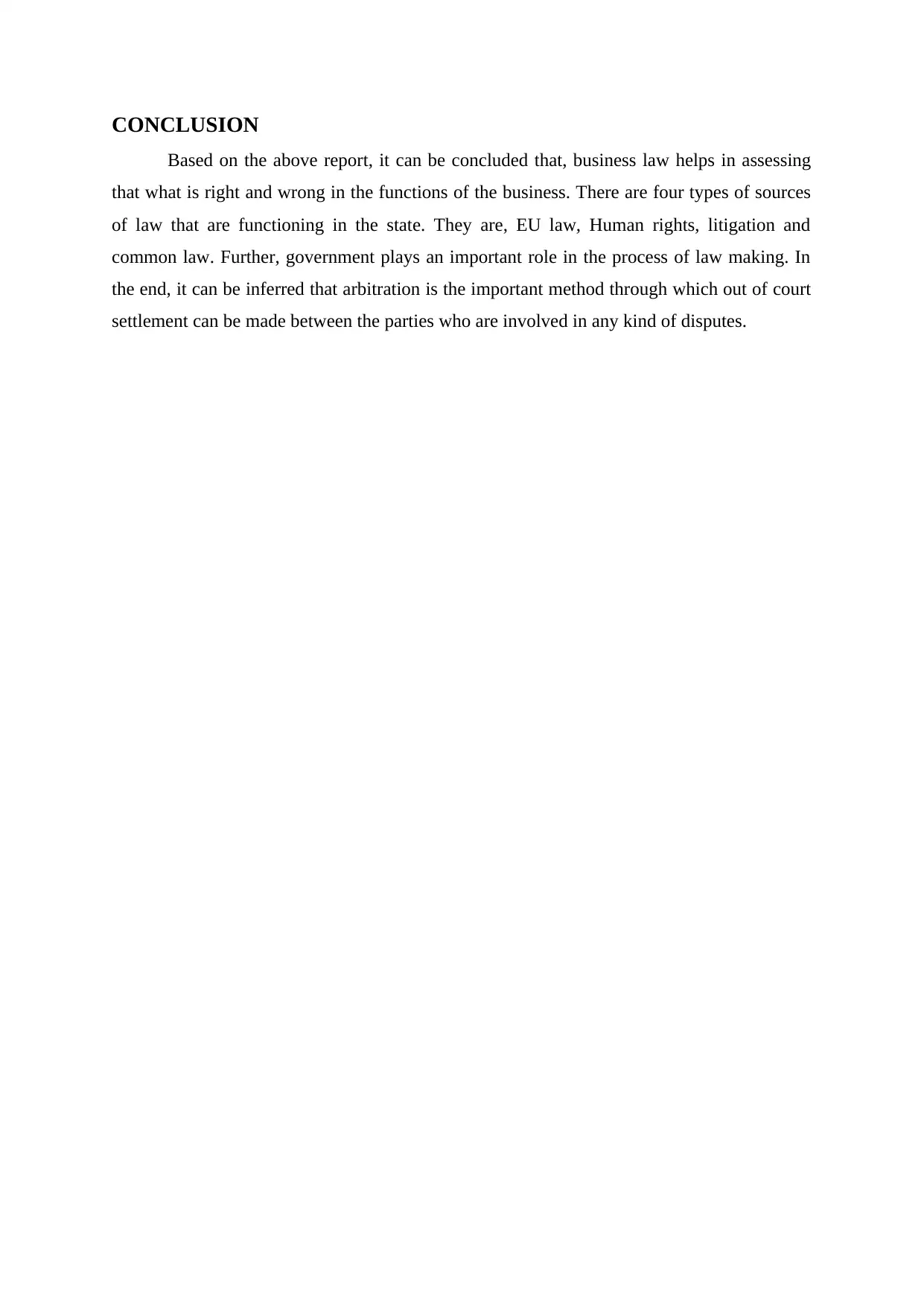
CONCLUSION
Based on the above report, it can be concluded that, business law helps in assessing
that what is right and wrong in the functions of the business. There are four types of sources
of law that are functioning in the state. They are, EU law, Human rights, litigation and
common law. Further, government plays an important role in the process of law making. In
the end, it can be inferred that arbitration is the important method through which out of court
settlement can be made between the parties who are involved in any kind of disputes.
Based on the above report, it can be concluded that, business law helps in assessing
that what is right and wrong in the functions of the business. There are four types of sources
of law that are functioning in the state. They are, EU law, Human rights, litigation and
common law. Further, government plays an important role in the process of law making. In
the end, it can be inferred that arbitration is the important method through which out of court
settlement can be made between the parties who are involved in any kind of disputes.
Paraphrase This Document
Need a fresh take? Get an instant paraphrase of this document with our AI Paraphraser
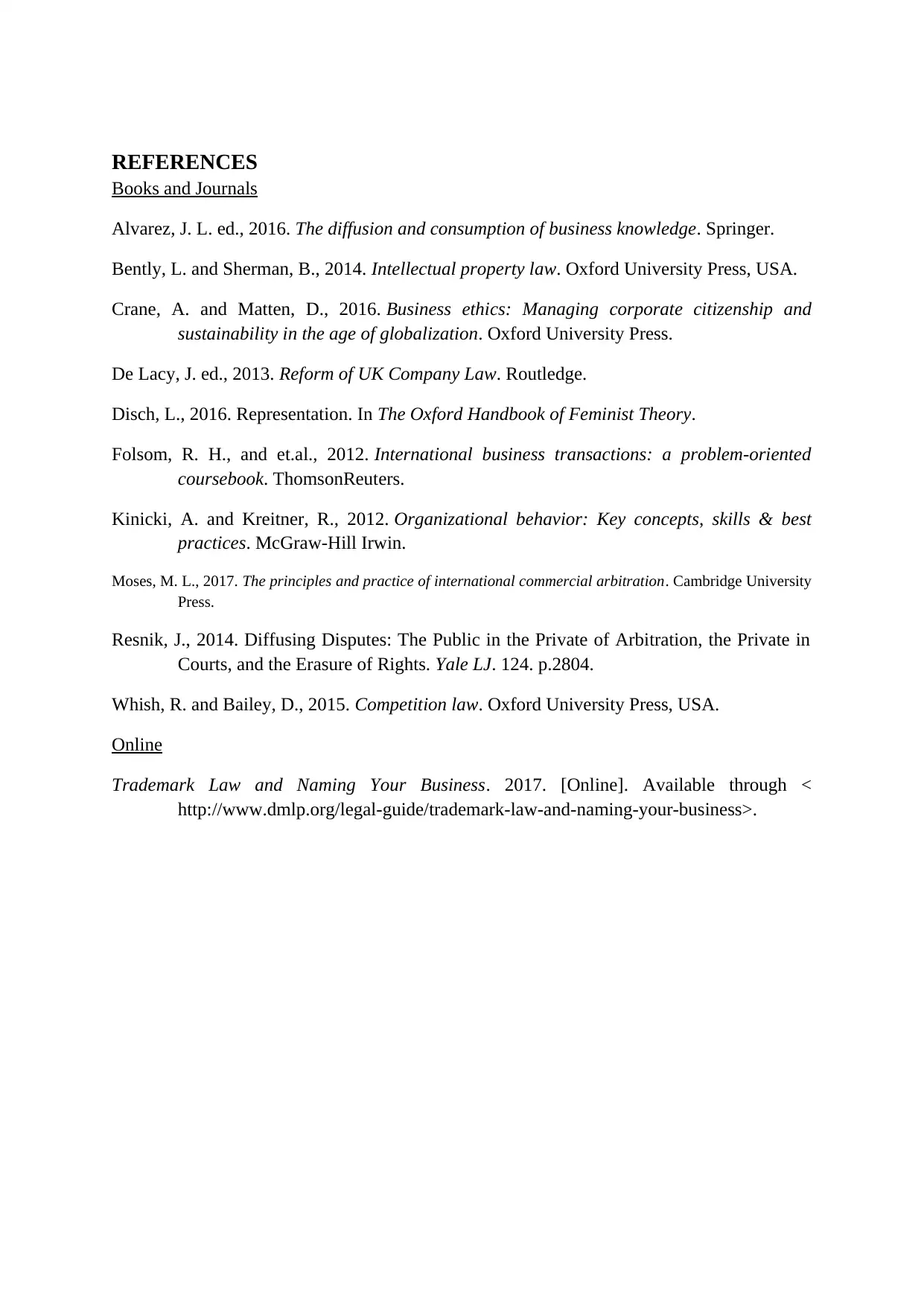
REFERENCES
Books and Journals
Alvarez, J. L. ed., 2016. The diffusion and consumption of business knowledge. Springer.
Bently, L. and Sherman, B., 2014. Intellectual property law. Oxford University Press, USA.
Crane, A. and Matten, D., 2016. Business ethics: Managing corporate citizenship and
sustainability in the age of globalization. Oxford University Press.
De Lacy, J. ed., 2013. Reform of UK Company Law. Routledge.
Disch, L., 2016. Representation. In The Oxford Handbook of Feminist Theory.
Folsom, R. H., and et.al., 2012. International business transactions: a problem-oriented
coursebook. ThomsonReuters.
Kinicki, A. and Kreitner, R., 2012. Organizational behavior: Key concepts, skills & best
practices. McGraw-Hill Irwin.
Moses, M. L., 2017. The principles and practice of international commercial arbitration. Cambridge University
Press.
Resnik, J., 2014. Diffusing Disputes: The Public in the Private of Arbitration, the Private in
Courts, and the Erasure of Rights. Yale LJ. 124. p.2804.
Whish, R. and Bailey, D., 2015. Competition law. Oxford University Press, USA.
Online
Trademark Law and Naming Your Business. 2017. [Online]. Available through <
http://www.dmlp.org/legal-guide/trademark-law-and-naming-your-business>.
Books and Journals
Alvarez, J. L. ed., 2016. The diffusion and consumption of business knowledge. Springer.
Bently, L. and Sherman, B., 2014. Intellectual property law. Oxford University Press, USA.
Crane, A. and Matten, D., 2016. Business ethics: Managing corporate citizenship and
sustainability in the age of globalization. Oxford University Press.
De Lacy, J. ed., 2013. Reform of UK Company Law. Routledge.
Disch, L., 2016. Representation. In The Oxford Handbook of Feminist Theory.
Folsom, R. H., and et.al., 2012. International business transactions: a problem-oriented
coursebook. ThomsonReuters.
Kinicki, A. and Kreitner, R., 2012. Organizational behavior: Key concepts, skills & best
practices. McGraw-Hill Irwin.
Moses, M. L., 2017. The principles and practice of international commercial arbitration. Cambridge University
Press.
Resnik, J., 2014. Diffusing Disputes: The Public in the Private of Arbitration, the Private in
Courts, and the Erasure of Rights. Yale LJ. 124. p.2804.
Whish, R. and Bailey, D., 2015. Competition law. Oxford University Press, USA.
Online
Trademark Law and Naming Your Business. 2017. [Online]. Available through <
http://www.dmlp.org/legal-guide/trademark-law-and-naming-your-business>.
1 out of 11
Related Documents
Your All-in-One AI-Powered Toolkit for Academic Success.
+13062052269
info@desklib.com
Available 24*7 on WhatsApp / Email
![[object Object]](/_next/static/media/star-bottom.7253800d.svg)
Unlock your academic potential
Copyright © 2020–2026 A2Z Services. All Rights Reserved. Developed and managed by ZUCOL.





